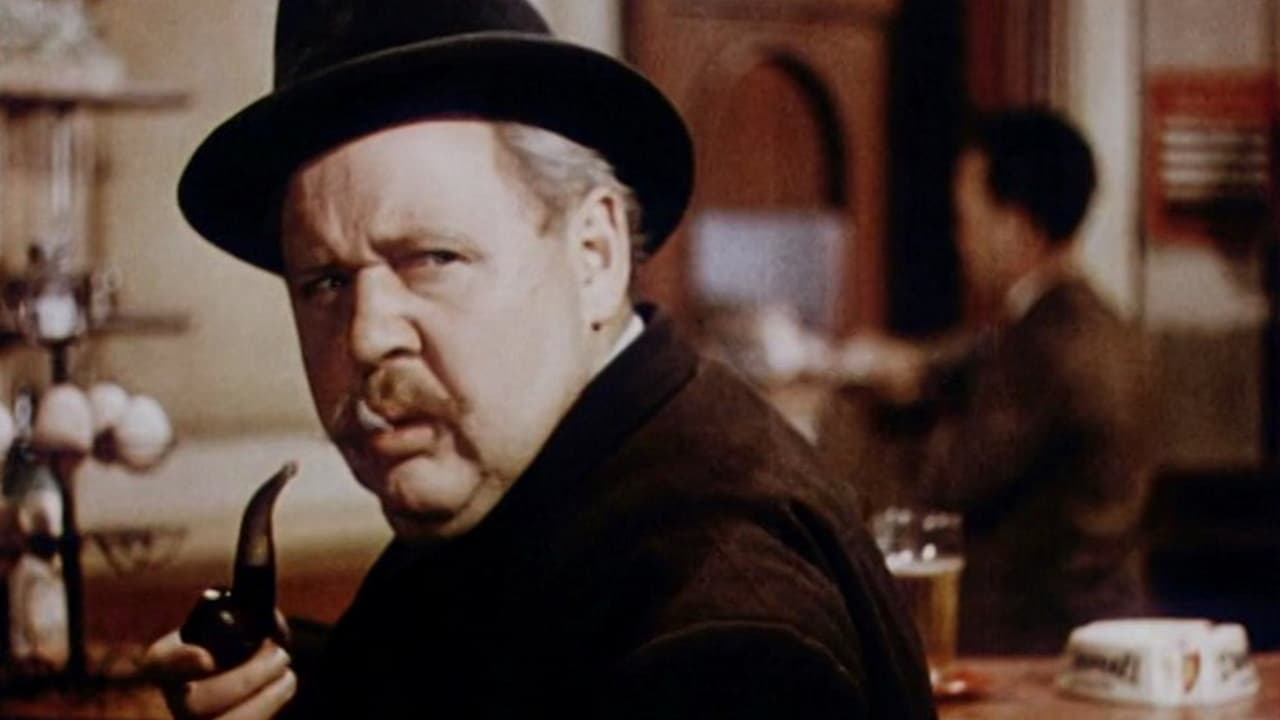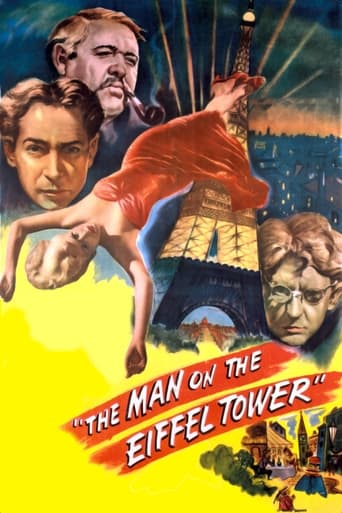Holstra
Boring, long, and too preachy.
StyleSk8r
At first rather annoying in its heavy emphasis on reenactments, this movie ultimately proves fascinating, simply because the complicated, highly dramatic tale it tells still almost defies belief.
Mabel Munoz
Just intense enough to provide a much-needed diversion, just lightweight enough to make you forget about it soon after it’s over. It’s not exactly “good,” per se, but it does what it sets out to do in terms of putting us on edge, which makes it … successful?
Stephanie
There is, somehow, an interesting story here, as well as some good acting. There are also some good scenes
Leofwine_draca
THE MAN ON THE EIFFEL TOWER is an adaptation of one of Georges Simenon's detective novels featuring the Poirot-alike detective, Maigret. It features a headlining Charles Laughton playing Maigret himself, but oddly Laughton is the weakest part of the movie and can do nothing with the part. He just sort of wanders around and simpers without doing anything in the way of crime fighting.The murder story is a little better, once it gets going. It sees a wealthy aunt murdered and the finger of suspicion falling on a down-on-his-luck knife grinder, played by Burgess Meredith who was old even at this early stage of his career. Meredith does his best to elude capture by the police, but Maigret suspects another man, played by the delightfully urbane Franchot Tone, is responsible.If I'm honest, THE MAN ON THE EIFFEL TOWER isn't really up to much as a detective story. The pace is plodding, the story underdeveloped, and the characters largely unlikeable. Where it succeeds is in the visuals, which are frequently stunning. This was an early colour production that brings a teeming, bustling Paris to life and is sure to have location photography at all of the major places, bringing them to life. Even better, the film features a series of tense chase sequences which frequently use high-rise locales to their advantage. The Eiffel Tower-set climax is the best remembered of the bunch, but I preferred a rooftop chase that takes place halfway through and is like an early Parkour scene. David Belle, eat your heart out!
Richard Burin
The Man on the Eiffel Tower (Burgess Meredith, 1949) is really, really odd, perhaps due to the troubled production, with Irving Allen replaced by Meredith and future Night of the Hunter director Charles Laughton taking charge of the scenes featuring his co-star. The story is fragmented and the direction wildly erratic - sometimes vividly expressionistic, at other times consisting of the cast simply standing in a big line - but at least we've got a restored copy now. Previous touring prints had degraded to such an extent that they had turned sepia, except for Meredith's bright red hair. The plot sees manic depressive Franchot Tone - yes, apparently bipolar disorder is the same as megalomania if you've got it not only in your heart, but "also up here" (I have no idea) - repeatedly taunting useless detective Inspector Maigret (Laughton) en route to a climactic confrontation up Le Tour Eiffel. Laughton is lacklustre, Meredith peculiar and Tone looks about 108 - his grey hair dyed chestnut - though he's quite effective in a one-note role. English leading lady Patricia Roc is also among the bafflingly illustrious cast, but she's given virtually nothing to do. The real star is the Ansco Color photography (unsung MGM masterpieces Kiss Me Kate and Brigadoon were two one of the few other films shot in the short-lived process) shot at sites around Paris, from the banks of the Seine to Les Deux Magots (an old haunt of Hemingway's) and the eponymous monument.
dougdoepke
It's almost like someone was channeling the same year's The Third Man, except there must have been a lot of static on the line. Critics are right—the story line is darn near incoherent. See if you can follow who does what and why. The thread is about as choppy as a sausage string. The best parts are the extended glimpses of Paris we get as the characters race across the landscape usually for unfathomable reasons. I'm just sorry the color from Ansco on my DVD has bled, particularly the reds. Still, there are some really majestic shots of the tower in bright sunlight.What the movie does have is some really quirky acting, a surprise or two, and a rather humorous undercurrent. Meredith made a career out of eccentric roles. Here his jack-of-all-trades has coke bottle glasses, a mop of red hair, and a ton of agility. And, of course, there's the rotund Laughton, suggesting that the Paris police have fairly loose fitness standards. I'm just sorry we don't see more of Patricia Roc (Mrs. Kirby), the movie's one charming character. Just why Mr. Kirby (Robert Hutton) would jilt her for the wooden blonde Edna (Jean Wallace) is perhaps the movie's biggest mystery. And poor Belita, she's got featured billing and maybe three lines in the whole 90 minutes. Anyway, there may be parallels with the Welles classic, but this one amounts to a poorly narrated disappointment, despite a nail-biting climax.
dbdumonteil
Few people know it,but it is actually a remake:Simenon's novel was already transferred to the screen in 1932 as "La tête d'un Homme" (A man's head) by Julien Duvivier.Although highly praised on the site ,I found Duvivier's movie confused and however he is my favorite French director.What partially redeemed this otherwise average movie was Inkijinoff's performance as Radek the intellectual gone mad and an unfriendly look at the bourgeoisie (in the remake the nephew can sleep the sleep of the just)When they remake a Duvivier movie,American producers have a tendency to use the Eiffel tower (see also Duvivier's "La Fete à Henriette" remade as "Paris when it sizzles" ) whereas they never go there in the French versions.The director seems more interested in Paris and its monuments than in his story which ,like Duvivier's script ,remains desultory and confused .I admire Franchot Tone (here credited as co-producer) some of his films are among my favorites ("Lives of a Bengal Lancer" "Three Comrades" "mutiny on the Bounty" also with Laughton)but his performance here is not really convincing.Taking the character to "les Deux Magots" ,the café for intellectuals which Sartre made famous is not enough to make us believe Radek has a high I.Q.Charles Laughton is also miscast as Maigret,and,most of the time ,he has nothing to do.The ending is ,admittedly,spectacular,but it 's only for the show.It does not bring anything to the film as a whole.

